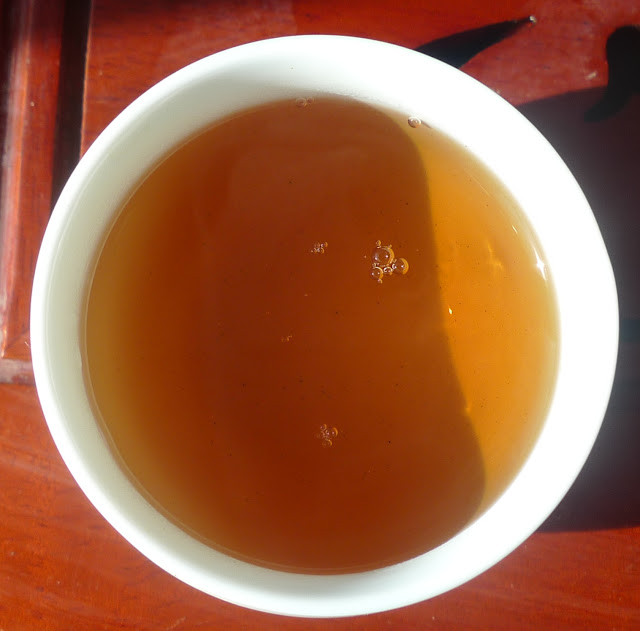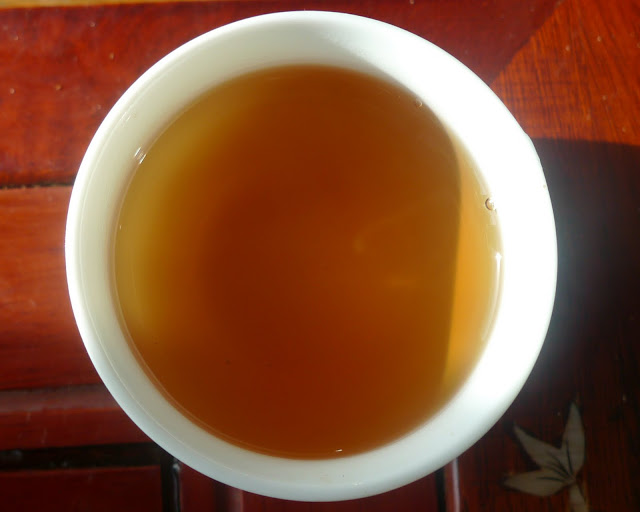This evening, I want to write about a tea, which was something entirely new to me. And I quickly fell in love with it - after a month of drinking it, I'm still surprised by it every time I taste it.
It is a roasted, rather highly oxidized aged wulong from Taiwan. I want to emphasize "aged" (i.e., it is not merely old). I do not believe that a tea anywhere near to this one would be produced without aging.
Let's have a look at dry leaves:
They are really dark in color and the aroma is really special. It smells of smoked almond and walnuts. The smokiness is very delicate and pleasant. Nevertheless, I have drank teas with more pleasantly smelling dry leaves.
I decided to use Brita-filtered water boiled on a tea stove. This tea is great even when brewed with electric kettle boiled water, but the water from a tea stove is much better.
I like to use these bone porcelain cups for darker wulongs, it may be used instead of a sniffer - it keeps the aroma in the cup.
I rinsed the tea with a rather cold water - about 50°C I believe. The smell of leaves after rinsing has improved immensely. The aroma is thick as a brick, strong, much more complex and pleasant than the smell of dry leaves. There are strong tones of chocolate, cocoa and nougat, all rolling on a layer of sweetness.
This looks promising:
I used pearl water - about 95°C for following brews.
- 1st brew: 15s
- The brew is light in color, very clear.
- The aroma is very powerful and heavy (one wouldn't expect it of such a light brew), slightly smoky (this will vanish in further brews), nougat-like.
- The taste is very special. It is heavy, very sweet (not like honey, it reminds me of treacle), it has complex, long and full body. The taste reminds me of great whiskey. The taste of nougat and chocolate is dominant, along with a slight woodiness (oak), a bit of smokiness and a bit of vanilla. There is not much fruit, maybe raisins?
- The aftertaste is long, great, full, nothing unpleasant jumps at you. The tea has been re-roasted several times, but very delicalely, it is not over-roasted (which can be often felt in cheaper roasted TGY in the aftertaste).
- 2nd brew: 15s
- The tea broth is very thick, perfectly clear.
- The aroma is even more powerful than in case of the first brew. It is somewhat hard, yet tender and soothing (again, it reminded me of great aged whiskey).
- The taste is even better and more complex than the one of the first brew. Even the smallest of sips leads to an explosion of tastes and sweetness (this brew is also great when being 5 seconds long , more of these tastes will be in further brews to enjoy). At first, there is dark chocolate and nougat, giving way to lovely sweet woodiness - I could identify it here - it's like good old oak cognac kegs.
- The aftertaste is looong, oak-like with almonds and vanilla in taste.
- 3rd brew: 10s
- The broth is getting darker, it is very pleasant though.
- The aroma of dry leaves is incredible, above all, tones of sweet cofee have appeared.
- The taste is similar to the taste of the second brew, it is a little less sweet, the cofee appears in the taste lightly and nicely.
- Aftertaste is slightly emptier than the aftertaste of the second brew but still very complex and at least 5 minutes long (until the water in my kettle boils again :)).
- 4th brew: 10s
- The broth is still dark, really enjoyable to look at I think.
- The aroma is sweeter than in the third brew.
- There is a change in taste: dark chocolate and cocoa are not so dominant (still present though), nougat is notably powerful, changing into raisins and that awesome cognac-keg aftertaste.
- The aftertaste is, as noted, cognac-keg-like, sweet, great.
- 5th brew: 15s
- The broth is still very thick, but lighter than previous brews.
- The aroma of leaves has changed again - the aroma of burning applewood has joined the oak (I'm not a beaver, nor a looney, we burned a lot of applewood in the countryside so I happen to know how it smells/tastes). The aroma of the tea is similar to the aroma of leaves.
- The taste has changed again: first, there are sweet tones of oak and applewood, followed by nougat, which is again followed by the Allen taste again. All tastes are still in harmony.
- The aftertaste is still sweet, intense, complex and all that. The tea has an incredible stamina.
- 6th brew: 30s
- The broth is lighter again, but still thick and clear.
- The aroma is still powerful, though maybe a bit harder than in previous brews. It is cocoa-like, with a bit of cofee and wood.
- The taste may not be so deep and full as in previous brews, but it is still great (and my girlfriend who came to me at that time was very surprised that it was so deep and full - so even though it was not as complex as in previous brews, it is still very good). It is woody-nougat-cofee like.
- The aftertaste is oak-like still, with walnuts.
- 7th, 8th, 9th brew: 60, 90, 120s
- All of these brews were similar in nature, nice taste, not so sweet, more woody, a little smoky, the aftertaste is still long and intense. No weak stuff.
The tea would manage another two brews, but I would not... enough for today.
I do not like to be so yippie about this tea, but once again, it is great. It probably is not a tea for everyone I think. Its taste reminds me of good, aged cognac - not everyone likes that eiter.
One last thing which surprised me about this wulong: Cha Qi: This tea had it (strong and calm). I find that many new taiwanese wulongs lack it seriously (later, I read in the Art of tea that it is not only my opinion).












Tento komentář byl odstraněn autorem.
OdpovědětVymazatGreat article Jakub.
OdpovědětVymazatHighly rousted wulong teas are very lovely for me. I like dark tones and types of taste that can be found in this type of wulong. I would like to taste this Ali shan, if it is possible.
Cajik (from e-cajovna)